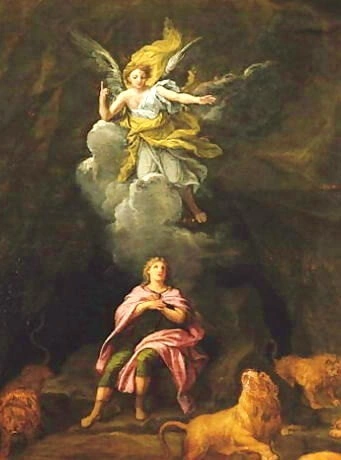291. "Blessing and honor and glory and strength be to Him who sits on the throne, and to the Lamb, forever and ever!" This symbolically means that present in the Lord from eternity and so in His Divine humanity is everything of heaven and the church - Divine good and truth, and Divine power - and these are present from Him in people who are in heaven and in the church.
To be shown that the Lord from eternity is Jehovah, who in the process of time took on human form in order to redeem and save mankind, see no. 281 above. He who sits on the throne, therefore, means the Lord from eternity, who is called the Father, and the Lamb means the Lord in respect to His Divine humanity, which is the Son. Moreover, because the Father is in the Son, and the Son in the Father, so that they are one, it follows that both the one sitting on the throne and the Lamb mean the Lord. And because they are one, we are also told that the Lamb was in the midst of the throne (verse 6, and so, too, 7:17).
To be shown that blessing, when said in connection with the Lord, means everything of heaven and the church present in Him, and from Him in people who are in heaven and in the church, see no. 289 above; and that honor and glory mean Divine good and truth, also no. 249. It is apparent, moreover, that strength, when said in connection with the Lord, means Divine power.
That these are all properties of the Lord can be seen from the following verses in Daniel:
Behold, One like the Son of Man (came) with the clouds of heaven! And He came to the Ancient of Days... Then to Him was given dominion and glory and a kingdom, and all peoples, nations, and languages will serve Him. His dominion is an everlasting dominion, which shall not pass away, and His kingdom one which shall not perish. (Daniel 7:13-14)
The Ancient of Days is the Lord from eternity, as is apparent from this verse in Micah:
You, Bethlehem Ephrathah, though you are little among the thousands of Judah, yet out of you shall come forth to Me One who will be Ruler in Israel, and whose goings forth are from of old, from the days of eternity. (Micah 5:2)
And so, too, from this verse in Isaiah:
...unto us a Child is born, unto us a Son is given; ...the government will be upon His shoulder. ...His name will be called... Counselor, God, Hero, Father of eternity, Prince of Peace. (Isaiah 9:6)







